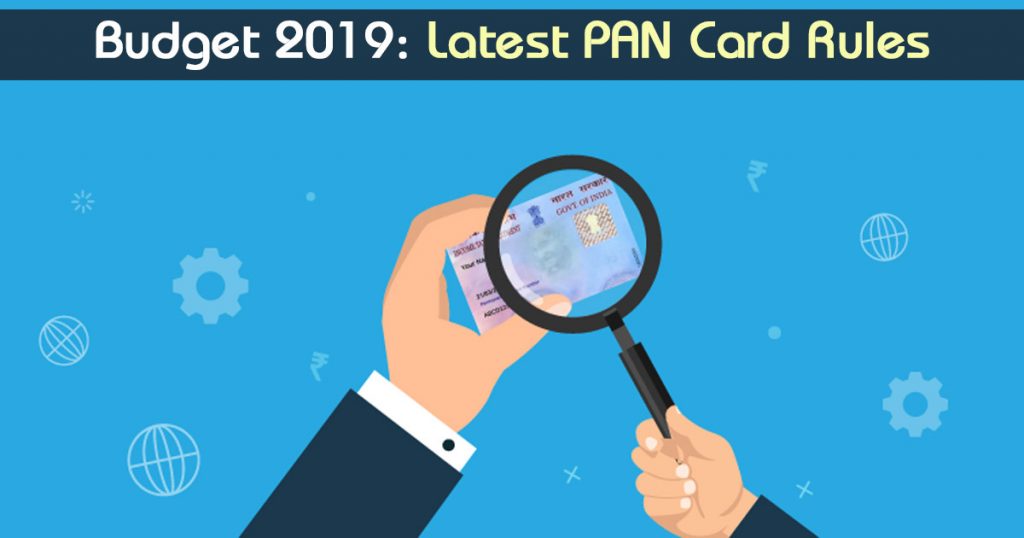
Permanent Account Number (PAN) is marching forward towards becoming an inevitable number for any transaction or deal made by an individual. Time is approaching when there is a need to link all the transactions with the Income Tax Department through PAN.
PAN basically assists the tax authorities in identifying an individual or a corporate body which is getting into a deal or making a transaction. Transactions may be a tax payment, money withdrawal, cash deposition or encashment of amount deposited in the bank for any deal.
Budget 2019 has proposed some changes and inclusion in the current PAN associated rules and provisions. We are highlighting the four most important of them which one must be acquainted with.
Here we go for the new PAN related norms which will become effective post the Budget 2019 announcement:
Effect of Not linking PAN with Aadhaar
At present, u/s 139AA (2), the PAN issued to an individual shall be considered ‘invalid’, if the individual is unsuccessful in intimating the Aadhaar number. However, when a person is unsuccessful in intimating the Aadhaar number and fails to link PAN with Aadhaar, the PAN card will deem to be inoperative.
Note: 30th September 2019 is the due date to link PAN with Aadhaar.
As per Budget 2019, the word ‘invalid’ will be replaced with ‘Inoperative’, on 1st September 2019.
Equivalence of PAN and Aadhaar for ITR Filing
For filing of ITR, a PAN linked with Aadhaar is an ad hoc. But in cases when someone doesn’t hold a PAN, Budget 2019 has proposed to permit the use of Aadhar number in place of PAN. According to the proposal, any person who needs to quote his PAN under the legal section but he doesn’t have any PAN and possesses only the Aadhaar number, may furnish or quote the Aadhaar number in place of PAN. PAN will be issued to the person based on Aadhar details.
Involuntary Quoting of PAN in Statutory Stated Deals
Having PAN is indispensable in some cases like when the income of an individual exceeds the basic exemption limit, when ITR has to be filed or when the turnover of a business exceeds Rs 5 lakh. In other cases, PAN is not mandatory.
However, the government has been witnessing that in multiple instances when people are engaging in high-value transactions like the purchase of foreign currency or withdrawal of hefty amount from the banks, they do not hold a PAN.
So to keep an audit record of these transactions and for expanding the tax base, Budget 2019 proposed to add a new clause (vii) in section 139A (1) which makes it makes it mandatory for every person, who is willing to enter into some statutorily stated deals and do not hold a PAN, to apply for a PAN allotment.
TDS Deduction for Professional Service
As per the new Permanent Account Number (PAN) rule, you will need to deduct the TDS before making payment when you appoint a professional contractor, designer or an architect for the construction or renovation of your home. The new rule counts in any professional service availed for personal purpose, so now the TDS has to be deducted before making the payment for such professional service and deposited with the government using the professional’s PAN. At present, TDS need not be deducted when payment is made for professional services availed for personal use.
Further, if the individual is engaged in business or profession which is not accountable for audit, there is no need to deduct TDS even when the payment is made business or profession purpose.
Read Also: How to Check the Status of My PAN Card? Active or Deactivated!
However, the government realised that because of this exemption, a good amount of monetary payment made by individuals for the professional service or the contractual work creates a loophole for levying TDS which leads to tax evasion.
So to seal this escape, Budget 2019 has proposed to include a new section 194M in the Act to levy 5% TDS on the amount paid for the contractual work or professional services by a person if such amount goes above Rs 50 lakh in a year.
At the same time to lessen the compliance, it is also proposed that such persons will be needed to acquire the Tax deduction Account Number (TAN) and will be allowed to deposit the tax deducted with their PAN and the PAN of professional.
These are the mutation which will be introduced in the rules and regulations which are related to PAN. It is always advantageous to be on board with the upcoming changes so that it will not feel like clash on later dates when they will finally step on the legal paths. Further penalties and mistakes can be averted easily if you move parallel with the latest notifications and norms.